When cold winds at -5℃ sweep across your fingertips, a high-quality pair of gloves can reduce heat loss by over 60%, while an ill-fitting pair may cause hand temperature to drop by 15℃ within 10 minutes. Winter gloves are not just warmth tools but also a reflection of safety protection and quality of life. This guide will help you find the perfect winter gloves from four dimensions: material characteristics, scenario adaptation, technological innovation, and purchasing tips.
Leather stands out as a classic choice for its excellent durability and fit. Natural leather conforms to hand shape naturally, providing superior abrasion resistance, but note that it's unsuitable for wet environments and requires regular maintenance. High-quality sheepskin gloves are especially suitable for daily commuting, offering both fashion and wind resistance.
Wool is ideal for extremely cold weather, retaining 80% of warmth even when damp. Its natural breathability effectively prevents overheating and sweating, though some people may feel slight itchiness. Wool blend gloves usually contain 3%-5% spandex to enhance elasticity while reducing shrinkage after washing.
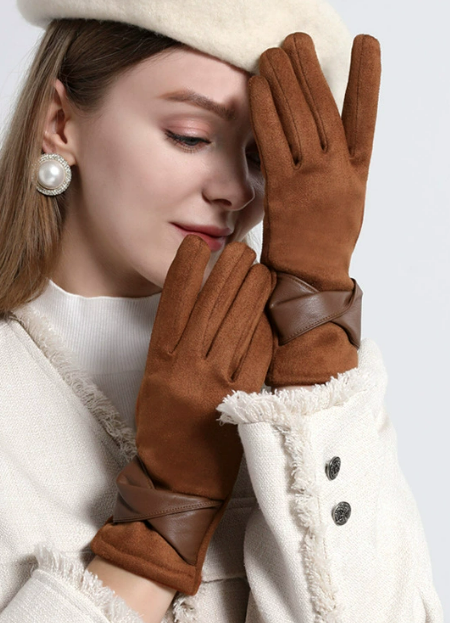

Nylon and Polyester synthetic fabrics have become mainstream for skiing and other outdoor sports due to their quick-drying properties. Professional ski gloves must pass ISO 811 testing, withstanding ≥15000mmH₂O water pressure for 3 minutes without leakage, while meeting the breathability standard of RET value <8m²Pa/W.
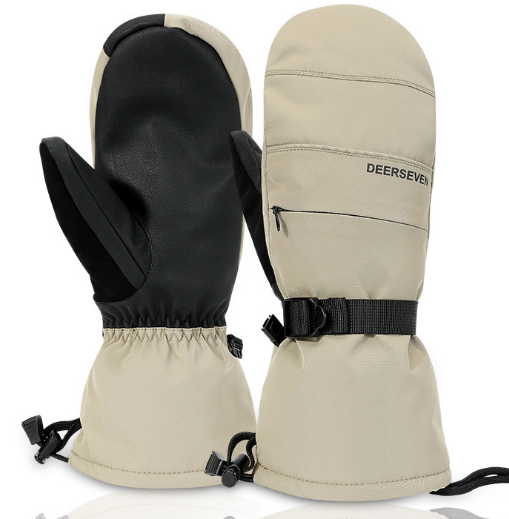
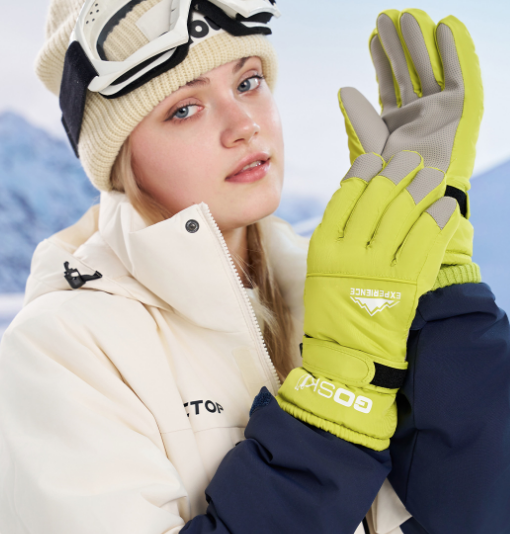
Material | Key Advantages | Ideal Use | Considerations |
Leather | Durable, windproof, form-fitting | Daily commute, fashion | Moisture-sensitive, needs maintenance |
Wool | Warm when wet, breathable | Low-temperature static environments | Potential itchiness, average durability |
Synthetic Insulation | Lightweight warmth, quick-drying | Outdoor activities, sports | Moderate breathability |
Rubber Latex | Extreme cold resistance, waterproof | Industrial work, cold storage | Higher cost |
Ski gloves must triple protection: waterproof outer layer against snow intrusion, insulating middle layer to lock in heat, and non-slip palm for safe equipment handling. Professional models adopt pre-curved finger joint technology with palm pattern anti-slip bump matrix, increasing slip resistance by 42% on 45-degree inclined steel beams.
Hiking gloves emphasize balance between weight and warmth, typically combining windproof fleece outer layer with Thinsulate lining, with reinforced wear resistance at finger tips. For high-altitude hiking, choose styles with wrist tightening systems to prevent snow intrusion.


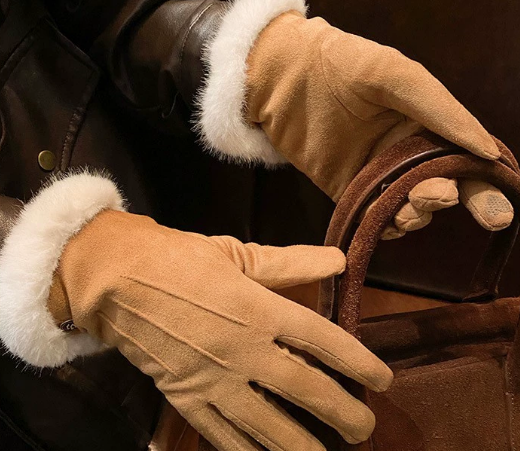
Touchscreen compatibility has become essential for modern gloves. Gloves with Command™ nanoparticle conductive technology offer conductivity even exceeding human skin, without wear failure like traditional coatings. Silver-coated nylon and copper-infused threads are two mainstream solutions—the former suits daily high-frequency use, while the latter excels in durability.
Fashion gloves focus on material mixing and tailoring, such as leather and knit combinations that maintain warmth while enhancing operational flexibility. Night commuters may opt for designs with EN511 standard reflective strips to enhance visibility in low light.

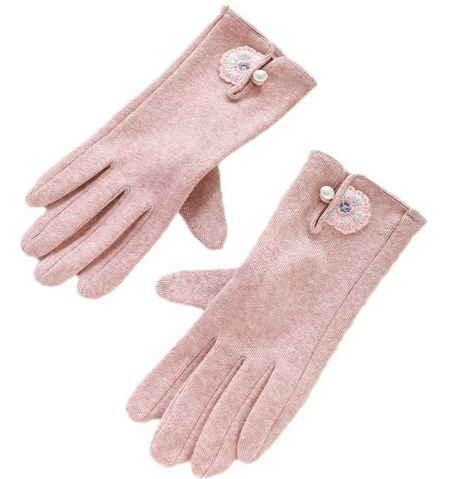
Industrial protective gloves should be selected based on job type: chemical industry should use nitrile rubber gloves resistant to liquids with pH 2-12; electrician gloves need precise 0.8mm fingertip thickness, balancing insulation and operational sensitivity. Cold chain workers are advised to prepare two pairs: regular models for -10℃ environments and 3mm flocked thickened versions for -30℃ cold storage.
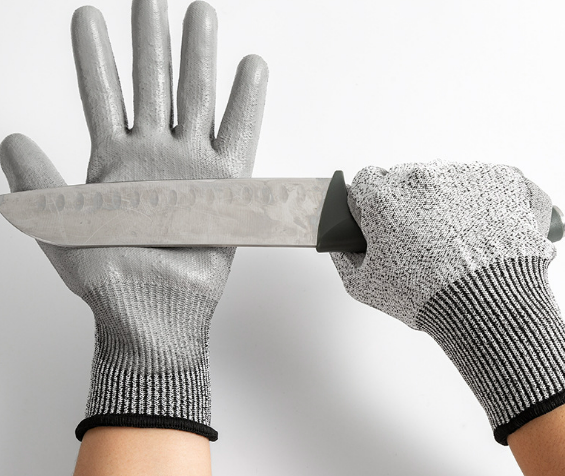
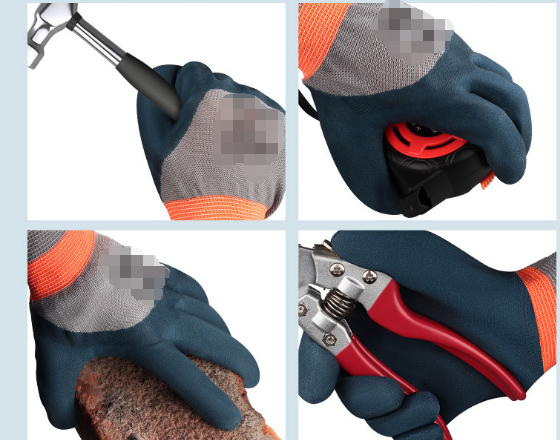
New-generation touchscreen gloves embed conductive nanoparticles into fibers instead of using traditional fingertip coatings. This technology ensures conductive performance throughout the glove's lifespan, maintaining over 90% sensitivity even after 50 washes. Test data shows gloves with this technology respond 30% faster than ordinary products with 65% lower misoperation rate.
2025 new gloves introduce "temperature adaptation" concept through three-layer structure: outer windproof and waterproof membrane blocks cold air intrusion, middle phase change material absorbs or releases heat according to temperature changes, and inner moisture-wicking fibers quickly expel sweat. It automatically maintains hand microenvironment comfort within -20℃ to 5℃ range.
3D hand scan data-based stereo tailoring solves traditional glove joint discomfort issues. Especially the wavy fold design at thumb base improves grip comfort by 40%. The elastic wrist closure adopts gradient pressure design, ensuring while avoiding blood circulation obstruction.
1. Basic Measurement: Use a soft ruler to measure palm width at the widest point (between index finger and thumb base) and circumference 1cm below thumb root. Add 0.5-1cm for winter gloves to accommodate insulation layers.
2. Coin Positioning Method: Place a 1-yuan coin against palm center, observe middle finger tip extension beyond the coin. Choose one size larger if extension exceeds 1.5cm—particularly effective for online shopping.
3. Joint Feature Consideration: Those with prominent finger joints should prioritize stretch knit styles or stereo tailoring to avoid discomfort from rigid leather.
Note: Approximately 35% of people have over 0.3cm size difference between hands; measure the dominant hand and record maximum values. Wool blend gloves may shrink 3%-5%, so reserve space during purchase.
• Waterproof Test: Professional waterproof gloves should indicate ISO 811 hydrostatic pressure test results; daily use recommends ≥5000mmH₂O products
• Breathability: Outdoor gloves should have moisture vapor transmission rate ≥5000g/m²/24h to avoid stuffiness during activity
• Leather gloves: Apply special leather conditioner every 2-3 weeks, avoid moisture contact
• Wool gloves: Use neutral detergent for gentle hand washing, dry flat to prevent stretching
• Waterproof gloves: Refresh DWR coating annually with waterproof spray to restore water resistance
• Touchscreen gloves: Avoid bleach to prevent conductive material failure
The right winter gloves should be invisible guardians, providing warmth in cold winds, freedom during activities, and safety when needed. Whether professional equipment for conquering snow-capped mountains or fashion accessories for urban strolls, through material understanding, scenario matching, and scientific measurement, you're sure to find the perfect pair. Remember, the best winter gloves are the ones you forget you're wearing.
Contact: Mr. Zhang
Phone: 17896381338
E-mail: honor@honorgroupltd.com
Add: No.12308, Jingshi road, Jinan,Shandong, China